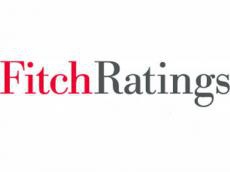|
|
TODAY.AZ / Business
Fitch Ratings appraises Azerbaijan’s banking system
29 March 2012 [17:32] - TODAY.AZ
 Fitch Ratings says in a newly-published report that the credit metrics of Azerbaijan's banks have stabilised since the height of the global financial crisis, and currently high oil prices are supporting asset quality and liquidity in the sector, Fitch Ratings Deputy Director for Financial Institutions in the CIS Dmitry Abramov said at the presentation "Azerbaijan's banking system: recovery after crisis" today.
Fitch Ratings says in a newly-published report that the credit metrics of Azerbaijan's banks have stabilised since the height of the global financial crisis, and currently high oil prices are supporting asset quality and liquidity in the sector, Fitch Ratings Deputy Director for Financial Institutions in the CIS Dmitry Abramov said at the presentation "Azerbaijan's banking system: recovery after crisis" today.However, credit impairment remains significant following rapid pre-crisis growth, and loan recoveries are hampered by weak governance and transparency in the corporate sector and a still depressed real estate market, he said.
Limited profitability and often moderate capital cushions restrict banks' ability to absorb losses, and the system, like the broader economy, remains highly exposed to any significant negative oil price shock, he added.
Fitch expects loan growth in 2012 to remain broadly in line with the 21 percent expansion reported for 2011. New credit is being extended primarily to the retail and SME segments, an expansion supported by the currently moderate leverage in the economy: loans/GDP stood at 20 percent at end-2011, with loans/non-oil GDP at 45 percent. However, weaknesses in the corporate sector, a deceleration of real GDP growth rates and the tighter monetary stance of the authorities are constraining credit expansion, he stressed.
Sector development is also undermined by the capital deficit of the International Bank of Azerbaijan (IBA), the country's largest bank accounting for nearly 35 percent of system assets. In February 2012, after a protracted period of capital ratio breaches by IBA, the authorities announced a recapitalization plan for the bank involving contributions of both subordinated debt and equity. Although these measures will help to bring IBA's capital ratios into compliance with statutory requirements, Fitch believes they are likely to be still insufficient relative to the bank's asset quality problems, he noted.
/Trend/
URL: http://www.today.az/news/business/104535.html
 Print version
Print version
Views: 1332
Connect with us. Get latest news and updates.
See Also
- 29 August 2025 [12:29]
No final decision yet on subway fare changes in Baku - 29 August 2025 [12:21]
Baku, Seoul strengthen ties in cadastre systems and digital mapping - 28 August 2025 [14:56]
Azerbaijan, Argentina discuss expansion of economic cooperation - 28 August 2025 [13:32]
Azerbaijan presents tourism potential in Bangkok - 28 August 2025 [11:23]
ASCO’s “Garadagh” dry cargo ship undergoes major overhaul - 27 August 2025 [14:55]
Azerbaijan to train 100 Chinese-speaking tour guides - 27 August 2025 [14:16]
Azerbaijani construction products rank among top 3 on Alibaba.com - 27 August 2025 [13:37]
Azerbaijan, Uganda explore cooperation in the energy sector - 27 August 2025 [12:43]
Azerbaijan to create new international transport route linking Gulf and Black Sea, says Deputy PM - 27 August 2025 [11:02]
Azerbaijan to open permanent tourism office in China next year
Most Popular
 Baku has put all the dots above the "I" in the issue of the Zangezur corridor
Baku has put all the dots above the "I" in the issue of the Zangezur corridor
 Youth Camp of CIS Countries wraps up in Lachin
Youth Camp of CIS Countries wraps up in Lachin
 Azerbaijan, Argentina discuss expansion of economic cooperation
Azerbaijan, Argentina discuss expansion of economic cooperation
 Azerbaijan joins CIS Deputy Prosecutors General meeting in Moscow
Azerbaijan joins CIS Deputy Prosecutors General meeting in Moscow
 Azerbaijan, EIB discuss prospects for stronger partnership
Azerbaijan, EIB discuss prospects for stronger partnership
 Azerbaijan, Venezuela reaffirm commitment to expand bilateral cooperation
Azerbaijan, Venezuela reaffirm commitment to expand bilateral cooperation
 President Ilham Aliyev receives EU Special Representative for South Caucasus
President Ilham Aliyev receives EU Special Representative for South Caucasus
